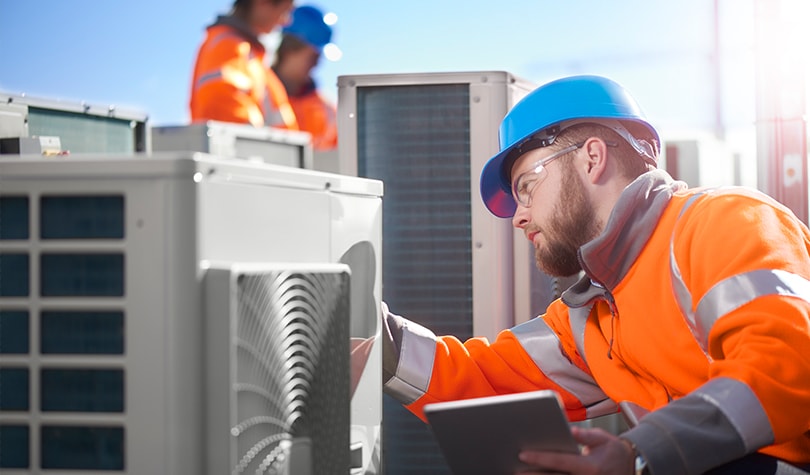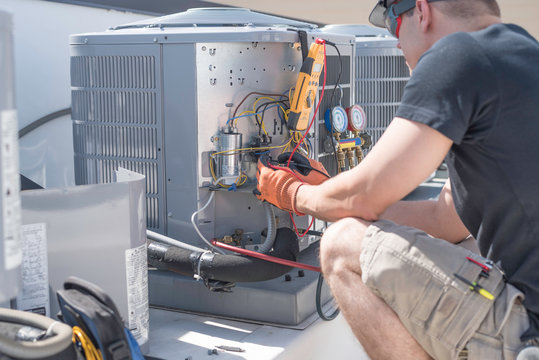Why you should schedule seasonal service with an HVAC contractor
Wiki Article
Everything about A/c: Identifying Common Issues and Effective Air Conditioning Repair Approaches
A/c systems are vital for maintaining interior comfort. Recognizing their elements and functionality is essential for determining common concerns. Property owners frequently encounter issues such as inadequate cooling, strange odors, or climbing energy prices. These signs can show underlying issues that might require interest. Exploring DIY troubleshooting strategies can be useful, yet understanding when to look for professional aid is equally crucial. What actions can be taken to ensure durable performance?Recognizing Your HVAC System: Parts and Capability
A heating and cooling system, typically taken into consideration the backbone of indoor environment control, includes several essential parts that collaborate to regulate temperature and air high quality. The key components include the heating unit, air flow system, and cooling device. The home heating unit, typically a furnace or boiler, produces heat throughout chillier months, while the cooling device cools down indoor spaces throughout the summer season.
Usual Cooling And Heating Troubles Homeowners Experience
Homeowners commonly encounter numerous usual a/c issues, consisting of inconsistent temperature distribution throughout their home. Furthermore, unusual noises throughout procedure can suggest underlying problems that require attention. Dealing with these concerns promptly is essential for keeping excellent system efficiency.Inconsistent Temperature Level Circulation
Numerous homes experience the frustrating concern of inconsistent temperature circulation, where specific rooms really feel uncomfortably cozy while others stay too cool. This issue frequently emerges from a range of elements, consisting of bad insulation, blocked vents, or a poorly sized a/c system. When ducts are not appropriately sealed or when furnishings obstructs air movement, some spaces might receive not enough cooling. In addition, thermostat placement can substantially impact temperature level policy; a thermostat situated in a sunlit area may misstate the overall temperature level of your house. Routine upkeep, including cleaning filters and making certain ductwork is clear, can assist relieve these inconsistencies. Homeowners may additionally consider zoning systems to much better control temperature levels throughout various areas of the home, promoting an extra comfortable living atmosphere.Uncommon Sounds During Operation
When an a/c system runs, unusual noises can suggest underlying concerns that require attention. Home owners may come across a variety of sounds, such as grinding, squeaking, or hissing. Grinding sounds frequently indicate damaged bearings or parts, while squealing can recommend loosened belts or components requiring lubrication. Hissing might indicate a refrigerant leak, which can endanger the system's effectiveness. Furthermore, banging audios could indicate loosened ductwork or a concern with the blower follower. Each of these sounds works as a caution, motivating homeowners to investigate even more. Disregarding these indications can cause more considerable problems and costly repairs. Normal maintenance and timely attention to unusual sounds can boost system long life and efficiency, making sure a comfortable living atmosphere.Signs That Indicate Your Air Conditioning Needs Repair
Just how can one inform if their a/c unit needs repair work? Several indicators might indicate underlying concerns needing professional focus. First, if the air conditioner falls short to cool the space properly, it may recommend a refrigerant leak or compressor breakdown. Additionally, a boost in energy expenses without corresponding use adjustments might signify ineffectiveness in the system. Property owners need to likewise be sharp to unusual scents originating from the unit, which might indicate mold development or electrical problems. Moreover, if the a/c frequently cycles on and off, it could be a sign of a malfunctioning thermostat or various other mechanical problems. The presence of water merging around the device can show a clogged drain line. Acknowledging these indicators early can conserve time and money, making certain that the air conditioning system operates effectively and efficiently.DIY Troubleshooting Techniques for Heating And Cooling Issues
When encountering a/c concerns, home owners can use numerous DIY fixing methods to determine the trouble. Trick approaches consist of examining thermostat setups, evaluating air filters, and evaluating drainage concerns. These actions can aid determine usual breakdowns before seeking professional support.Checking Thermostat Settings
What actions should home owners require to ensure their thermostat settings are appropriate? They must confirm the thermostat is set to the wanted temperature level and mode, whether heating or air conditioning. Inspecting for a clear display and confirming the thermostat is not established to "hold" or "getaway" mode is essential. Home owners must likewise verify that the thermostat is degree and installed in an area without drafts, direct sunshine, or other temperature affects. Additionally, rectifying the thermostat can assist provide exact readings. If the thermostat operates batteries, replacing them may settle any type of issues. By methodically evaluating these variables, property owners can often recognize and rectify thermostat-related troubles, promoting suitable heating and cooling system efficiency.Inspecting Air Filters
Air filters play a necessary role in preserving excellent heating and cooling efficiency. They catch dust, allergens, and various other particles, making sure tidy air circulation. In time, filters can come to be blocked, minimizing air movement and effectiveness. To evaluate air filters, individuals ought to initially situate the filter, frequently discovered in the return duct or near the heater. As soon as located, they ought to examine the filter's problem-- if it shows up unclean or discolored, it likely needs replacement. Many filters need altering every 1-3 months, relying on use and ecological variables. Normal inspection and timely replacement of air filters not only boost air quality but also prolong the lifespan of HVAC systems, preventing potential malfunctions and pricey fixings.
Evaluating Water Drainage Issues
Just how can home owners properly recognize and attend to drainage problems within their a/c systems? They need to check the condensate drain line for obstructions or clogs, which can lead to water build-up. Homeowners might utilize a wet/dry vacuum to get rid of any type of debris blocking the line. Next, checking the drainpipe pan for corrosion or look at here leaks is essential, as a harmed pan can create water to overflow. Routine cleansing of the drain line with a mixture of vinegar and water aids avoid future obstructions. Furthermore, ensuring appropriate slope of the drainpipe line advertises efficient water flow. If these do it yourself methods do not settle the concern, seeking advice from a specialist HVAC technician may be necessary to prevent potential water damage and system failure.When to Call an Expert for Air Conditioning Fixings

While some AC concerns can be dealt with via DIY methods, there are circumstances where calling an expert ends up being vital. Home owners should look for skilled support when they experience consistent issues, such as poor air conditioning, weird noises, or uncommon smells rising from the device. These signs and symptoms might suggest deeper problems that call for specialized expertise and tools to detect and repair properly.

Preventative Upkeep Tips for Heating And Cooling Long Life
Routine preventative upkeep can significantly improve the durability of cooling and heating systems. House owners need to arrange yearly inspections by certified specialists to evaluate system performance and identify potential concerns. Consistently transforming or cleansing air filters is vital, as this guarantees appropriate air movement and decreases pressure on the system. Additionally, examining and sealing ductwork stops power loss and improves general performance.
It is also suggested to maintain the exterior unit clear of debris and vegetation, enabling for peak air movement and heat exchange. Home owners must check the condensate drain for clogs to stay clear of water damage and mold growth. Moreover, maintaining appropriate thermostat settings and making use of programmable alternatives can boost power effectiveness. Recording upkeep activities assists track service background and can aid in identifying recurring problems. By complying with these preventative measures, people can maximize the efficiency and life-span of their cooling and heating systems
Regularly Asked Concerns
How Commonly Should I Change My Cooling And Heating System Filters?
Cooling and heating system filters should generally be changed every one to 3 months, depending on usage, filter kind, and environmental aspects. Regular replacement assists preserve efficiency and air top quality, guaranteeing peak system performance throughout the year.What Size HVAC System Do I Need for My Home?
To establish the suitable a/c system size for a home, one need to think about square video footage, insulation top quality, and local environment. Consulting a specialist can help assure maximum effectiveness and convenience for the particular living area.Are There Eco-Friendly Cooling And Heating Options Available?
Yes, green heating and cooling alternatives are available, consisting of energy-efficient heat pumps, solar-powered systems, and geothermal home heating. These options minimize power usage and ecological impact, promoting sustainability while keeping effective climate control for household and business areas.How Can I Improve My cooling and heating System's Power Efficiency?
To enhance a/c power performance, one can frequently keep the system, seal air leakages, mount programmable thermostats, utilize energy-efficient filters, and warranty appropriate insulation throughout the home to reduce power consumption and boost efficiency.
What Is the Average Life-span of a Cooling And Heating System?
The ordinary life-span of a HVAC system typically varies from 15 to 25 years, depending on factors such as upkeep, use, and the top quality of installment. Regular upkeep can significantly prolong its operational long life.Verdict
In recap, a thorough understanding of cooling and heating systems encourages property owners to determine common problems and address small issues successfully. Acknowledging that site indications of malfunction, employing DIY repairing methods, and focusing on normal maintenance can boost system efficiency and effectiveness. However, when confronted with complicated repairs, employing specialist aid is crucial to guarantee safety and security and longevity. By cultivating understanding and aggressive care, people can take pleasure in a comfortable interior setting while decreasing unforeseen costs related to a/c failures.Report this wiki page